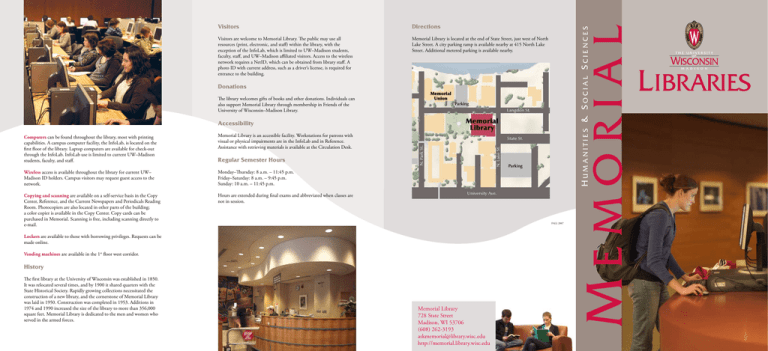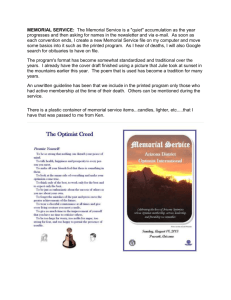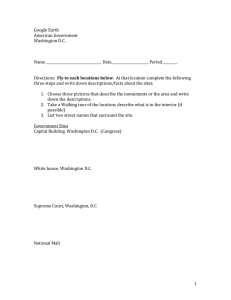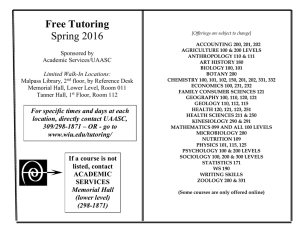L
advertisement

Visitors are welcome to Memorial Library. The public may use all resources (print, electronic, and staff) within the library, with the exception of the InfoLab, which is limited to UW–Madison students, faculty, staff, and UW–Madison affiliated visitors. Access to the wireless network requires a NetID, which can be obtained from library staff. A photo ID with current address, such as a driver’s license, is required for entrance to the building. Memorial Library is located at the end of State Street, just west of North Lake Street. A city parking ramp is available nearby at 415 North Lake Street. Additional metered parking is available nearby. Donations The library welcomes gifts of books and other donations. Individuals can also support Memorial Library through membership in Friends of the University of Wisconsin–Madison Library. Accessibility Memorial Library is an accessible facility. Workstations for patrons with visual or physical impairments are in the InfoLab and in Reference. Assistance with retrieving materials is available at the Circulation Desk. Computers can be found throughout the library, most with printing capabilities. A campus computer facility, the InfoLab, is located on the first floor of the library. Laptop computers are available for check-out through the InfoLab. InfoLab use is limited to current UW–Madison students, faculty, and staff. Regular Semester Hours Wireless access is available throughout the library for current UW– Madison ID holders. Campus visitors may request guest access to the network. Monday–Thursday: 8 a.m. – 11:45 p.m. Friday–Saturday: 8 a.m. – 9:45 p.m. Sunday: 10 a.m. – 11:45 p.m. Copying and scanning are available on a self-service basis in the Copy Center, Reference, and the Current Newspapers and Periodicals Reading Room. Photocopiers are also located in other parts of the building; a color copier is available in the Copy Center. Copy cards can be purchased in Memorial. Scanning is free, including scanning directly to e-mail. Hours are extended during final exams and abbreviated when classes are not in session. FALL 2007 Lockers are available to those with borrowing privileges. Requests can be made online. Vending machines are available in the 1st floor west corridor. History The first library at the University of Wisconsin was established in 1850. It was relocated several times, and by 1900 it shared quarters with the State Historical Society. Rapidly growing collections necessitated the construction of a new library, and the cornerstone of Memorial Library was laid in 1950. Construction was completed in 1953. Additions in 1974 and 1990 increased the size of the library to more than 356,000 square feet. Memorial Library is dedicated to the men and women who served in the armed forces. Memorial Library 728 State Street Madison, WI 53706 (608) 262-3193 askmemorial@library.wisc.edu http://memorial.library.wisc.edu MEMORIAL Directions HUMANITIES & SOCIAL SCIENCES Visitors LIBRARIES About Us Memorial Library provides world-class collections, facilities, and services to ensure the success of students, faculty, researchers, and staff at the University of Wisconsin–Madison. As the major research library in the state, Memorial also serves the local community and beyond. Collections within Memorial that merit special mention include: • Collections Memorial is the principal research library on campus for the humanities and social sciences. Housing more than three million volumes on 75 miles of shelving, it is the largest single collection in Wisconsin. As the flagship library of UW–Madison, Memorial facilitates interdisciplinary scholarship in cooperation with more than forty campus libraries. The campus library system ranks among the largest in the United States. Memorial’s unique and rich collections span more than 350 languages and include journals, dissertations, newspapers, government documents, electronic resources, and other media selected to meet the needs of the UW–Madison’s teaching, learning, and research communities. The world-class area studies collections support the many international research centers and programs on campus. For example, the library has some of the best collections in North America for German language, literature and history; Ibero-American studies; and South Asian languages and literature. Other exceptional collections include those related to the study of Shakespeare, Scandinavian studies, French literature, and Italian linguistics. Users can search the collection via the online catalog, MadCat. Electronic resources, including journals and databases, can be accessed through the libraries’ Web site. • Borrowing Department of Special Collections. The Department includes rare books, manuscripts and archives, printed ephemera, pictorial materials, and a significant reference collection. Among the collection strengths are English and American literature, history of science, history of the book, illustrated natural history, European collections, and philosophy and theology. Noteworthy collections are the Little Magazines Collection, the Cairns Collection of American Women Writers, and the Fry Collection on Italian History and Culture. Mills Music Library. The collection consists of approximately 500,000 items in a wide variety of formats, including books, journals, sheet music, recordings, and electronic resources. Special strengths include the Wisconsin Music Archives, Americana, musical theater, recorded sound, and ethnomusicology. Renovated in 2007, the library includes hands-on listening/viewing rooms, an audio/reserves facility, study space, a seminar room, and a recording facility. Journals & Newspapers Current issues of approximately 4,000 of Memorial Library’s most heavily used journals and U.S. and international newspapers are available in the Current Periodicals and Newspapers Reading Room. The remaining 14,000 titles are located in the library stacks and are arranged by call number. Many are also available in electronic format. Nonprint Materials Videos, DVDs, microfiche, microfilm, and other media are located in the Microforms/Media Center (MMC) or the library stacks. Facilities for viewing, printing, and scanning of microforms are also found in the MMC, as well as for viewing DVDs and videos. Reference & Research Services A skilled staff of reference librarians is available to help with using the library and its resources. They provide assistance in person, by phone, by e-mail, and by electronic chat. Reference librarians can help library users: • Conduct their research more efficiently • Understand advanced search techniques • Navigate and interpret library and Internet resources • Manage and organize information • Assist with grants research • Locate government documents • Identify experts in and beyond Memorial Library • Place requests for interlibrary loans and journal article deliveries • Find factual information Individuals with a UW ID or an Annual Fee Card may borrow materials and use interlibrary loan services. Faculty may request “runner cards” to allow their students to request and pick up materials for them from any campus library. Items can be requested from any UW–Madison or UW System library and delivered to Memorial. Memorial Library materials may be picked up from or returned to any campus library. Loan periods vary for different library user groups and for different types of materials. Interlibrary Loan & Document Delivery Books, articles, and other materials not available on the Madison campus can be requested free of charge through interlibrary loan. Articles available on campus may be requested for a small fee. Journal articles are sent electronically; other materials can be delivered to Memorial Library. Subject-Specific Help Subject specialist librarians assist with research related to areas in which they have in-depth knowledge and expertise. Some of those areas include specific fields, languages, geographic areas, historical periods, or types of materials. They also select library materials for the collection in their area and serve as liaisons to academic departments. Subject librarians can help identify the best sources for research in a specific area and provide oneon-one research consultations. Along with subject librarians, two service points that offer specialized assistance include the Grants Information Collection and the Women’s Studies Office. Library Instruction Workshops, tours, and customized instruction for courses, groups, and individuals help students and faculty learn skills for more successful research. Instruction is free and usually includes hands-on practice. Guides to library resources and services customized for courses also are available. Topics may include: • Licensed journal databases • MadCat (online catalog) • Internet resources • Scholarly publishing • Information management software • Research strategies • Subject-specific workshops • Sources for grants information Facilities The entire library is designed to be conducive to research and study. A wide variety of work environments are available throughout the building. • • • • Quiet study is a feature of Memorial Library. Several areas have been specially designated for silent work. Group study rooms may be reserved online. Some have computers and wide screen monitors. Comfortable seating is available in the Current Periodicals and Newspapers Reading Room and throughout the second floor. Study carrels are located throughout the library. Faculty and qualifying graduate students may reserve a locked carrel online. Open carrels are available on a first-come, first-served basis.



